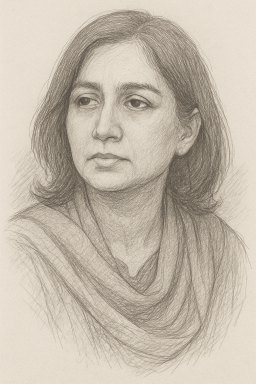Main Jab Tak Aai Bahar by Gagan Gill (2024)
SAHITYA AKADEMI AWARD IN HINDI
Chaifry
5/24/20254 min read
Gagan Gill, a distinguished Hindi poet born in 1959 in Sri Ganganagar, Rajasthan, is renowned for her evocative explorations of grief, womanhood, and existential longing, drawing inspiration from her mother, Dr. Nirmal Verma, and her global academic reach in universities across the United States, England, and Germany. Her poetry collection Main Jab Tak Aai Bahar (Until I Reached the Outside), published in 2017 by Vani Prakashan, earned the prestigious Sahitya Akademi Award in 2024 for its profound lyrical depth and emotional resonance. Comprising four sections with seven poems each, the collection navigates the desolation of personal loss and the search for meaning in a fragmented world. This review argues that Main Jab Tak Aai Bahar is a masterful work of Hindi poetry, distinguished by its stark imagery and emotional intensity, though its abstract themes and cultural specificity may pose challenges for some readers. Through an analysis of its poetic craft and thematic richness, this review highlights Gill’s significant contribution to Indian literature.


Main Jab Tak Aai Bahar is a poetic journey through grief, isolation, and the quest for transcendence, reflecting Gill’s personal experiences of loss and her engagement with universal human struggles.
The title, translating to “Until I Reached the Outside,” suggests a movement toward liberation or revelation, yet the poems dwell in the liminal space of emotional and existential void. Structured in four sections, the collection explores themes of absence, the rejection of sustenance, and the collapse of time, often using stark natural imagery to mirror inner desolation. Gill writes:
“Main jab tak aai bahar / Khali ho chuke the hamare haath.”
(Until I reached the outside, / Our hands had already emptied.)
This opening sets the tone of loss and futility. Another poem laments the cessation of life’s rhythms:
“Achannak khatam ho gaye sab kaam / Ruki rah gayi hawa mein saans.”
(Suddenly all tasks ended, / Breath halted in the air.)
The rejection of nourishment symbolizes emotional starvation:
“Pehle ann hua asweekar / Phir phal doodh sab.”
(First grain was refused, / Then fruit, milk, everything.)
A fourth quote captures temporal disintegration:
“Kala hua chand khidki ke bahar / Vanaspatiyan kali din kala.”
(The moon turned black outside the window, / Vegetation blackened, the day blackened.)
The poems, written in free verse, blend Hindi’s lyrical cadences with Buddhist and Sanskrit influences, reflecting Gill’s engagement with meditative traditions and her North Indian heritage.
Main Jab Tak Aai Bahar is a poetic tour de force, radiating with Gill’s ability to transform personal grief into universal resonance. Her language, sparse yet piercing, crafts a visceral emotional landscape, as seen in: “Kam hue ghante ghat aur pal / Langdi hui ghadi phir looli.” (Hours lessened, moments and vessels dwindled, / The clock limped, then became lame.) This imagery, blending temporal decay with physical disability, exemplifies Gill’s innovative metaphors, praised in Amazon reviews as “exquisite” and “light years away from platitudes”. Her Buddhist influences, noted in reader comments for their echoes of meditative texts, lend the poems a contemplative depth, aligning with the introspective tradition of Hindi poets like Muktibodh. The collection’s structure—four sections of seven poems—creates a rhythmic progression, mirroring the stages of grief, which earned its Sahitya Akademi recognition for “outstanding literary merit”.
The collection’s strengths lie in its emotional authenticity and lyrical precision. Gill’s focus on feminine experience, rooted in her personal struggles as a woman, infuses the poems with a quiet feminist power, as in her portrayal of silent endurance: “Na bachi chinta na koi prarthana” (Neither worry nor prayer remained). This resonates with readers who value its “stunning” impact, as noted in Amazon reviews, and its academic study in global universities underscores its universal appeal. The sparse free verse, avoiding ornate Hindi conventions, ensures accessibility while maintaining depth, appealing to both scholars and casual readers. The collection’s engagement with Sanskrit-to-Hindi linguistic challenges, as highlighted by a reviewer, adds intellectual rigor, addressing cultural translation issues with subtlety.
However, Main Jab Tak Aai Bahar has limitations. Its abstract themes and heavy reliance on existential despair can feel unrelenting, potentially alienating readers seeking narrative clarity or emotional reprieve. The poem’s dense cultural references, such as Buddhist meditation or North Indian dissent, may require contextual knowledge, limiting accessibility for non-Hindi or international audiences, a critique echoed in discussions of regional poetry’s global reach. The lack of widely available English translations, despite its academic prominence, restricts its audience, a common challenge for Hindi literature. Additionally, the collection’s focus on personal grief offers limited engagement with broader social issues like caste or contemporary politics, unlike the societal critiques of poets like Dushyant Kumar. The unrelenting somber tone, while powerful, risks monotony, as some poems blur into repetitive imagery of darkness and loss.
Main Jab Tak Aai Bahar is a radiant milestone in Hindi poetry, showcasing Gagan Gill’s lyrical genius and her unflinching exploration of grief and existential longing. Its stark imagery, emotional depth, and cultural resonance make it a vital work, though its abstract themes, cultural specificity, and somber tone may demand patience and context. This collection is essential for poetry enthusiasts, scholars of Hindi literature, and those drawn to introspective narratives, offering a profound meditation on loss and transcendence. Readers are encouraged to approach it with an openness to its meditative and cultural nuances to fully savor its haunting beauty. Its Sahitya Akademi Award in 2024, conferred on March 8, 2025, during the Sahityotsav, affirms its enduring significance, cementing Gill’s legacy as a poet of unparalleled emotional insight.
Recommendation: Highly recommended for readers of poetry, Hindi literature, and existential themes.
References : Gill, G. (2017). Main Jab Tak Aai Bahar. New Delhi: Vani Prakashan.
